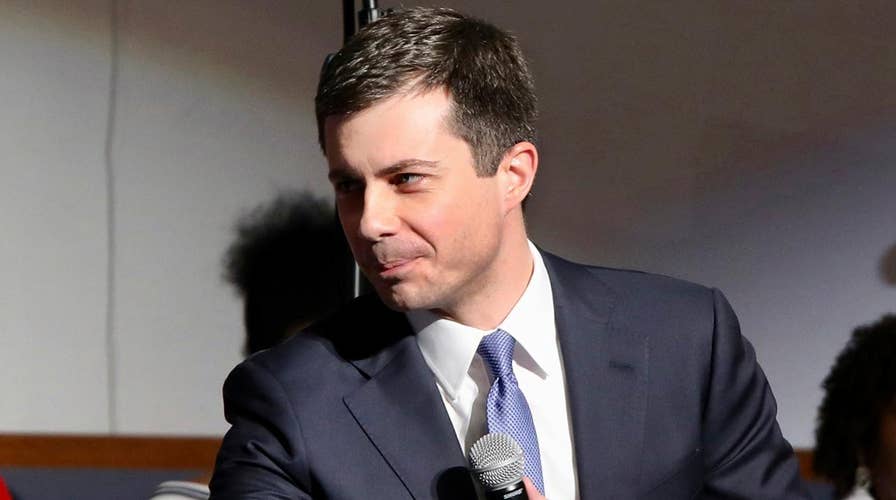Tracking Pete Buttigieg's rise from relatively unknown Midwestern mayor to Democratic presidential contender
Buttigieg's campaign emphasizes his time as a naval intelligence officer in Afghanistan and his experience as a decision maker in the mayor's office; Mike Tobin reports from South Bend, Indiana.
Wow, Pete Buttigieg is in big trouble now.
He once worked as a consultant to Best Buy. Who knows what nefarious plots they were cooking up amid the laptops and flat-screens?
Yes, the veil has finally been lifted on the mayor’s shadowy history as a corporate hack. After saying for weeks that he was bound by a nondisclosure agreement with the secretive McKinsey & Co., the Democratic presidential candidate finally got permission to release his client list.
IMPEACHMENT ARTICLES FUEL DEEPENING DISTRUST AND DIVISION
Besides Best Buy, he worked with Blue Cross Blue Shield of Michigan; Canadian grocery chain Loblaws; the Natural Resources Defense Council; the Postal Service; and the EPA, Energy Department and Pentagon.
Okay, the story was a lot sexier when we didn’t know who the companies and agencies were.
So why was this such a big deal?
For too many Democrats, there is something suspect about working for business. Were you doing anything shady? Did you advise companies to lay people off? Ever since the Dems used Mitt Romney’s time at Bain Capital as a club against him, political consultants have been on high alert for this sort of thing.
But what’s the alternative—people who have spent their entire lives in government, or in nonprofit groups? Wouldn’t a working knowledge of the business community be valuable experience for a president, even if the current one wasn’t a career real estate developer?
The Pete campaign gave the exclusive to the Atlantic, which took this stab at explaining the context:
“Buttigieg has intentionally tried to position himself as the next Barack Obama, another ‘young man with a funny name,’ as he put it in a big speech in Iowa last month. But this is among the points where they diverge. Obama took two years after college to work for a few thousand dollars a year as a community organizer in Chicago. Buttigieg came back from Oxford a Rhodes Scholar, and could have had almost any first job he wanted. He chose McKinsey, working out of a Chicago office a few miles from where Obama had been knocking on doors to fight for issues like tenants’ rights. To his critics, going to work at McKinsey at all says something about what the mayor values.”
And here’s the South Bend mayor’s response:
“Well, I chose to work in the private sector. Most Americans work in the private sector. And I think the experience I got there served me well. If you’re going to manage the largest economy in the world, it’s probably a good idea that you’ve had a little bit of professional experience looking at a balance sheet or knowing what an income statement is. I also walked away from the private sector early in my career to take on public service, and never looked back.”
SUBSCRIBE TO HOWIE'S MEDIA BUZZMETER PODCAST, A RIFF OF THE DAY'S HOTTEST STORIES
In other words, the Rhodes scholar says, I was only 23 or 24 at the time. I did my time, served in Afghanistan, and got into politics.
McKinsey is also controversial—it once recommended that ICE reduce food for migrants and medical care for detainees—and Buttigieg has had to distance himself.
“Since I’ve left, there are at least four cases that I can think of where someone at McKinsey has done something upsetting,” he said, adding that the company is “as amoral as the American business community in general.”
New York Times columnist Ross Douthat says Buttigieg follows in the footsteps of Bill Clinton and Barack Obama in embracing “wonkery, a vision of competence and expertise governing to some extent above ideology.”
Joe Biden, by contrast, is running “as a non-wonk, an anti-technocrat, the guy who’ll shout ‘malarkey!’ when the clever McKinsey guy shows up with the white paper and says you need to overhaul a popular program because there’s a more efficient way.”
So that’s what the election is about! (Biden, by the way, is back to a double-digit lead over everyone in the new Quinnipiac poll, with 29 percent, and Buttigieg at 9.)
I had similar thoughts after a Washington Post report on Elizabeth Warren, who has been hitting Buttigieg on his McKinsey work. Warren made a couple of million bucks as a corporate lawyer in the 1990s on behalf of such clients as Dow Chemical. In one case, the Post obtained a memo by the then-Harvard law professor as she was “representing a large development company that was trying to avoid having to clean up a toxic waste site.”
Unpleasant, but so what? Everyone knows lawyers are hired guns who will make arguments for almost any client.
The paper says it offered “a rare glimpse of Warren in action during her past work as a corporate consultant — one whose arguments were at times out of step with the liberal presidential campaign she is running today.”
And that’s the rub. Warren positions herself as a moral crusader against big corporations, giant banks and Wall Street, and it’s a little harder to square that narrative with her work back when she was a Republican.
But all this strikes me as something of a purity test. Some Democrats may vote against Buttigieg because of his youth, his relative inexperience or doubts that he can beat Donald Trump. But his lucrative two-year stint doing spreadsheets and Power Points seems besides the point.





















